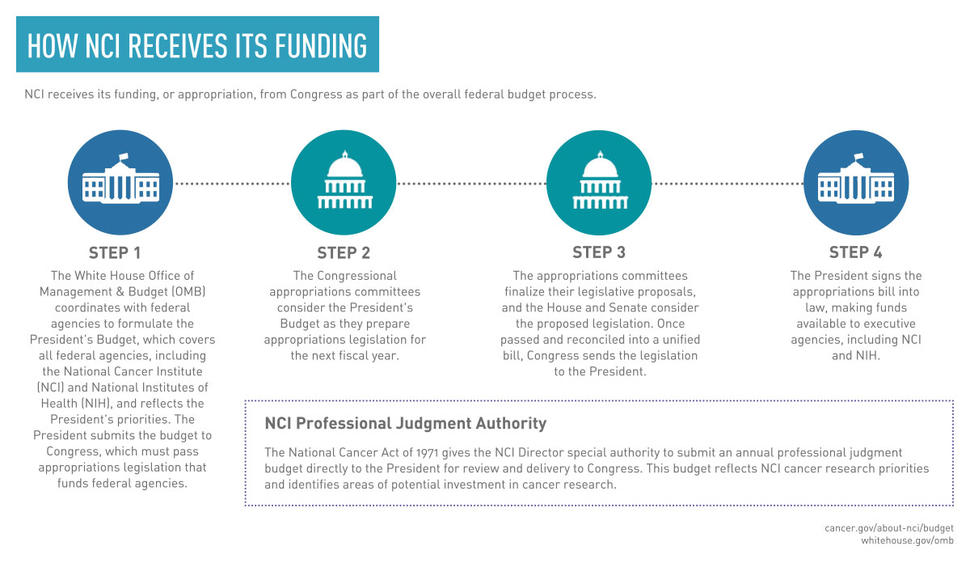NCI Mission
NCI leads, conducts, and supports cancer research across the nation to advance scientific knowledge and help all people live longer, healthier lives.
NCI Leads the National Cancer Program
As the leader of the cancer research enterprise, collectively known as the National Cancer Program, and the largest funder of cancer research in the world, NCI manages a broad range of research, training, and information dissemination activities that reach across the entire country, meeting the needs of all demographics—rich and poor, urban and rural, and all racial/ethnic populations. Specifically, NCI focuses on two broad roles:
Cancer Research
- Leads the nation’s research efforts to improve cancer prevention, detection, diagnosis, and survivorship
- Supports 73 NCI-Designated Cancer Centers and more than 5,000 grantees
- Coordinates and supports all phases of clinical trials across 3,100 clinical trial sites nationwide, seeking the development of new and improved cancer treatments
- Supports intramural research scientists in our own laboratories and clinics
- Partners with industry, private philanthropic organizations, other federal agencies, and other national and foreign institutions to engage in cancer research and training opportunities that otherwise might not be possible because of their complexity and cost
- Collaborates with private-sector life sciences companies to advance promising innovative technologies that fuel improvements in detection, diagnosis, and treatment of cancer
- Supports the Frederick National Laboratory for Cancer Research, the only federally funded research and development center dedicated exclusively to biomedical research
- Maintains long-term storage of publicly available cancer genomic and clinical data
- Supports construction of laboratories, clinics, and related facilities for cancer research
Training and Support for Cancer Researchers
- Strives to attract, train, and retain the best minds to become the next generation of cancer researchers
- Provides support to scientists and their institutions to create outstanding environments for researchers to train, conduct basic and clinical research, and care for cancer patients
- Funds training and career development opportunities across a broad spectrum of cancer research disciplines through training grants, fellowships, research career development awards, and research education grants
- Supports targeted cancer research training for individuals from backgrounds underrepresented in the biomedical and behavioral sciences to achieve and sustain a diverse workforce
- Provides comprehensive training programs that support the needs of qualified individuals at all stages of their career development, ranging from middle-school students to independent researchers
- Offers training opportunities centered in hospitals and research institutions across the nation, in addition to intramural training programs offered at NCI laboratories and offices in Maryland
How NCI Is Funded and Whom We Fund
As a federal agency, NCI receives its funds from Congress. The bulk of our budget supports extramural grants and cooperative agreements to facilitate research conducted at universities, medical schools, hospitals, cancer centers, research laboratories, and private firms in the United States and abroad. These funds also support intramural research at NCI’s laboratories and offices in Bethesda, Rockville, and Frederick, MD. See the NCI Budget Fact Book for a summary of NCI’s expenditures among various research programs and funding mechanisms.
NCI’s Impact
Our investments have led to declines in the rates of new cancer cases and cancer deaths overall in the last few decades in the United States. In line with this improvement, the number of cancer survivors in the United States has more than doubled from 7 million in 1992 to more than 18 million in 2018—and is expected to rise to 26 million by 2040. These trends reflect advances in cancer detection, diagnosis, and patient care that have resulted in people living longer, healthier lives than ever before.


